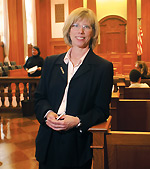Turning On Youth to Democracy
Open gallery

“Ssshh. Ssshh. Listen. Listen.”
En route from Springfield to the Classroom Law Project’s Annual Youth Summit in Portland, a van full of high school students had been clamoring for tunes, restless with the drone of the road and National Public Radio.
However, when commentary turned to Harriet Miers’ Supreme Court nomination, their chatter turned into rapt attention. A new generation of NPR listeners was born.
“In my heart of hearts, I always wanted to work with kids, to engage them and empower them to succeed,” says Barbara Rost, program director for the Classroom Law Project.
Incorporated in 1984, the nonprofit organization strives to preserve democracy by teaching it. Educators, lawyers, and civic leaders work with thousands of high school, middle school, and elementary students each year to demystify the legal system and to create informed and active citizens.
Ongoing programs include: We the People: The Citizen and the Constitution, which simulates congressional hearings; mock trial competitions at the regional, state, and national levels; Law Day workshops on issues such as forensics, hate crimes and terrorism, racial profiling, and religion in school; and the Youth Summit on legal or election issues.
The 2005 summit focused on the selection process for Supreme Court justices. When one of the attendees, a struggling student from an alternative high school, asked a question about the No Child Left Behind Act, Josh Carden, chief of staff for Oregon Senator Ron Wyden, asked for it in writing. He promised to have the senator pose the question to the nominee.
“At that moment, we changed a young man’s life,” says Rost.
Rost joined the Classroom Law Project on a part-time basis in 1997, not long after she and husband Terry Rost, a middle school science teacher, adopted two young daughters from China.
Each morning, Rost puts her girls on the elementary school bus, works full tilt until it’s time to pick them up, then fits in weekend and evening hours as needed.
“Working less than full time has been a godsend to me and my family,” she says.
Previously, Rost was a field representative and account manager at Westlaw, an online legal library service, and also managed one of the company’s regional offices. From 1993 to 1996, she was an admissions coordinator at Lewis & Clark Law School.
Now at the Classroom Law Project, she works with a four-person staff plus hundreds of volunteers, many of whom are graduates of the law school. In the future, she hopes to expand the program to more communities, especially in rural Oregon.
“I could be making a lot of money working somewhere else,” says Rost. “But to me, money is not as important as the message.”
–by Pattie Pace
More L&C Magazine Stories
Lewis & Clark Magazine is located in McAfee on the Undergraduate Campus.
MSC: 19
email magazine@lclark.edu
voice 503-768-7970
fax 503-768-7969
The L&C Magazine staff welcomes letters and emails from readers about topics covered in the magazine. Correspondence must include your name and location and may be edited.
Lewis & Clark Magazine
Lewis & Clark
615 S. Palatine Hill Road MSC 19
Portland OR 97219

